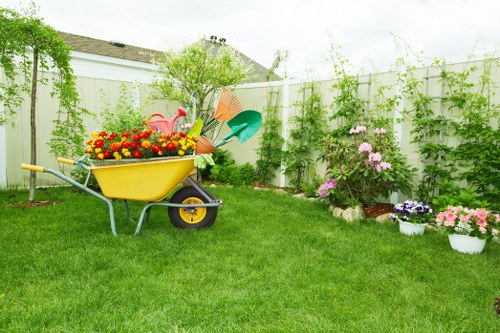Expert Garden Fence Replacement in Queensbury

Maintaining the beauty and security of your garden in Queensbury starts with a sturdy and aesthetically pleasing fence. Whether your current fence is damaged, outdated, or no longer serves its purpose, garden fence replacement in Queensbury is a valuable investment for any homeowner.
Choosing the right fence involves considering various factors such as material, style, and functionality. This comprehensive guide will help you navigate the process of replacing your garden fence, ensuring you make informed decisions that enhance both the value and appearance of your property.
From selecting the best materials to understanding local regulations, we cover everything you need to know about garden fence replacement in Queensbury.

Why Replace Your Garden Fence?
There are several reasons why homeowners in Queensbury opt for garden fence replacement:
- Security: A new fence can enhance the security of your property, keeping unwanted visitors and animals out.
- Privacy: Replacing your fence can provide greater privacy for your garden and outdoor spaces.
- Aesthetic Appeal: A modern fence design can significantly improve the look of your garden, adding to your home's curb appeal.
- Property Value: A well-maintained fence can increase the overall value of your property.
- Maintenance: Older fences may require frequent repairs. Replacing them with low-maintenance materials can save time and money in the long run.
Assessing the Condition of Your Current Fence
Before deciding to replace your fence, it's essential to evaluate its current condition. Look for signs of wear and tear, such as rotting wood, rusted metal, or broken panels. If repairs are extensive or frequent, replacement might be the more cost-effective option.
Consider the age of your fence as well. Most fences have a lifespan, depending on the materials used. If your fence is nearing the end of its expected life, it's time to start planning for a replacement.
Additionally, think about whether your current fence meets your needs. Have your privacy or security requirements changed? Does the style still complement your garden and home? These factors can influence your decision to replace your fence.

Choosing the Right Fence Material
The material you choose for your new garden fence plays a crucial role in its durability, maintenance, and appearance. Here are some popular options available in Queensbury:
- Wood: Wood fences offer a classic and natural look. They are highly customizable but may require regular maintenance to prevent rot and weather damage.
- Vinyl: Vinyl fences are low-maintenance and come in various styles and colors. They resist weathering and do not require painting or staining.
- Metal: Metal fences, such as aluminum or wrought iron, provide a sturdy and elegant option. They are durable but can be more expensive than other materials.
- Composite: Composite fences combine wood fibers and plastic, offering the appearance of wood with enhanced durability and lower maintenance.
- Chain-Link: Chain-link fences are affordable and durable, though they offer less privacy compared to other materials.
Wood Fence Replacement
Wood is a popular choice for garden fences due to its versatility and timeless appeal. In Queensbury, pressure-treated lumber is commonly used to resist decay and insect damage. You can also choose from various wood types, such as cedar, pine, or redwood, each offering different aesthetics and durability levels.
Regular maintenance, including staining or painting, is necessary to preserve the wood's appearance and extend its lifespan. Despite the upkeep, many homeowners prefer wood for its natural beauty and ability to blend seamlessly with garden landscapes.
Choosing a wood fence allows for customization in height, style, and finish, making it easy to match your garden's specific needs and design preferences.

Understanding Local Regulations and Permits
Before replacing your garden fence in Queensbury, it's important to be aware of local building codes and regulations. These rules dictate fence height, materials, and placement to ensure consistency and safety within the community.
- Height Restrictions: Most areas have specific height limits for fences, especially in front yards or near property lines. Typically, residential fences range from 4 to 6 feet tall.
- Material Restrictions: Some neighborhoods may have restrictions on fence materials to maintain a cohesive look. Check with your local council or homeowners' association for guidelines.
- Setback Requirements: There may be rules about how close your fence can be to the property line or sidewalk. Ensuring proper placement helps avoid disputes with neighbors.
Obtaining Necessary Permits
In Queensbury, fence installations that exceed certain heights or use specific materials may require a building permit. It's essential to contact the local building department to determine if a permit is needed for your project.
Failing to obtain the necessary permits can result in fines and may require you to modify or remove the fence, leading to additional costs and delays.
Hiring a professional fence contractor familiar with local regulations can help ensure that your garden fence replacement complies with all applicable laws and standards.

Selecting the Right Fence Style
The style of fence you choose should complement your garden's design and meet your functional needs. Here are some popular fence styles for garden replacement in Queensbury:
- Picket Fences: Ideal for creating a charming and traditional look, picket fences are commonly used in front gardens and around patios.
- Privacy Fences: These fences are designed to block the view from outside, providing a secluded space for your garden activities.
- Ornamental Fences: Featuring decorative elements, ornamental fences add elegance and sophistication to your garden.
- Farm-Style Fences: Durable and functional, farm-style fences are perfect for larger gardens or properties requiring robust boundaries.
- Lattice Fences: Offering partial privacy and a decorative touch, lattice fences are great for supporting climbing plants and adding visual interest.
Matching Fence Style to Garden Design
Your fence should enhance the overall aesthetic of your garden. For example, a rustic wooden fence pairs well with a natural, landscaped garden, while a sleek vinyl fence complements a modern outdoor space.
Consider the architectural style of your home as well. A harmony between your fence and house design creates a cohesive and attractive property.
Additionally, think about the functionality each fence style offers. Privacy fences are best for creating secluded areas, whereas ornamental fences can serve as decorative boundaries.
Installation Process for Garden Fence Replacement
Replacing a garden fence involves several steps to ensure a successful and long-lasting installation:
- Planning and Design: Determine the location, style, and materials for your new fence. Create a plan that outlines measurements and layout.
- Obtaining Permits: Secure any necessary permits from the local building department before starting the installation.
- Removing the Old Fence: Carefully dismantle and remove the existing fence, ensuring minimal damage to your garden and property.
- Preparing the Area: Clear the installation area of debris and level the ground if necessary. This step ensures the new fence is properly aligned and stable.
- Installing Fence Posts: Secure the fence posts by digging appropriate holes and setting them in concrete for added stability.
- Attaching Fence Panels: Once the posts are in place, attach the fence panels or rails according to your chosen design.
- Finishing Touches: Apply any necessary finishes, such as staining, painting, or sealing, to protect the fence and enhance its appearance.
Professional vs. DIY Installation
While some homeowners choose to install their garden fences themselves, hiring a professional fence contractor in Queensbury ensures that the job is done correctly and efficiently. Professionals have the experience and tools necessary to handle challenges that may arise during installation.
Additionally, a professional installation may include a warranty, providing peace of mind in case any issues occur after the fence is installed.
However, if you have the necessary skills and time, a DIY approach can save on labor costs. Just ensure you follow all guidelines and local regulations to achieve the best results.
Maintenance Tips for Longevity
Proper maintenance is key to ensuring your new garden fence remains in excellent condition for years to come. Here are some tips to extend the lifespan of your fence:
- Regular Cleaning: Remove dirt, debris, and organic matter regularly to prevent decay and deterioration.
- Inspect for Damage: Periodically check your fence for signs of damage, such as loose boards, rusted metal, or broken panels, and address issues promptly.
- Apply Protective Coatings: For wood fences, apply paint, stain, or sealant to protect against moisture and UV damage. Metal fences may require rust-resistant coatings.
- Reinforce Weak Areas: Strengthen any weak points in the fence structure to maintain stability and prevent further damage.
- Trim Nearby Vegetation: Keep plants and trees trimmed back to avoid moisture buildup and potential damage to the fence.
Seasonal Maintenance
Different seasons require specific maintenance tasks to keep your fence in top shape:
- Spring: Inspect for winter damage, clean the fence, and apply any necessary protective treatments.
- Summer: Monitor for signs of heat-related wear and ensure any stains or paints are holding up well.
- Fall: Prepare the fence for winter by sealing gaps and applying additional protective coatings.
- Winter: Protect the fence from snow and ice accumulation, and address any structural concerns caused by harsh weather.
Choosing Low-Maintenance Options
If you prefer a fence that requires minimal upkeep, consider materials and styles that are inherently low-maintenance. Vinyl and composite fences, for example, resist weathering and do not need regular painting or staining.
Opting for metal fences with rust-resistant coatings can also reduce maintenance needs. Additionally, selecting fence styles that prevent debris buildup, such as slatted or lattice designs, can make cleaning easier.
By choosing the right materials and taking proactive maintenance steps, you can enjoy a beautiful and functional garden fence with minimal effort.
Cost Considerations for Fence Replacement
Replacing a garden fence involves various costs that depend on several factors. Understanding these can help you budget effectively for your project:
- Material Costs: The type of material you choose significantly impacts the overall cost. Wood is generally more affordable, while metal and composite materials can be more expensive.
- Labor Expenses: Hiring a professional contractor will add to the cost, but it ensures a quality installation. DIY installations can save on labor but may require additional tools and time.
- Fence Height and Length: Taller and longer fences require more materials and labor, increasing the total cost.
- Design Complexity: Intricate designs or custom features may require more time and materials, affecting the price.
- Permits and Regulations: Obtaining necessary permits may involve fees, depending on local regulations in Queensbury.
Budgeting Tips
To manage costs effectively, consider the following tips:
- Compare Quotes: Obtain multiple quotes from local contractors to ensure competitive pricing.
- Choose Cost-Effective Materials: Select materials that balance durability and cost. Vinyl and pressure-treated wood are popular choices for their affordability and longevity.
- Plan for Maintenance: Invest in materials that require less maintenance to save on long-term costs.
- DIY When Possible: If you have the skills and time, handling some aspects of the installation yourself can reduce labor expenses.
- Prioritize Needs: Focus on essential features and aesthetics that matter most to you, potentially reducing unnecessary costs.
Financing Options
If the cost of fence replacement is a concern, explore financing options such as home improvement loans or payment plans offered by contractors. Some suppliers may also offer discounts or seasonal promotions to help offset expenses.
Planning and budgeting carefully can help you achieve the desired garden fence replacement without financial strain.
Benefits of Professional Installation
While DIY installation can be tempting, hiring a professional fence contractor in Queensbury offers numerous advantages:
- Expertise: Professionals have the necessary skills and experience to handle various installation challenges efficiently.
- Quality Assurance: Certified contractors ensure that the fence is installed correctly, adhering to local codes and industry standards.
- Time Savings: Professionals can complete the installation faster than most DIY projects, minimizing disruption to your daily routine.
- Warranty: Many contractors offer warranties on their workmanship and materials, providing peace of mind.
- Equipment and Tools: Professionals have access to specialized tools and equipment required for fence installation, ensuring a high-quality finish.
Choosing the Right Contractor
Selecting a reputable fence contractor is crucial for a successful replacement project. Consider the following when making your choice:
- Experience: Look for contractors with a proven track record in fence installation and replacement in Queensbury.
- Licensing and Insurance: Ensure the contractor is properly licensed and insured to protect against potential liabilities.
- References: Ask for references or view past projects to assess the quality of their work.
- Transparent Pricing: A reliable contractor should provide clear and detailed quotes, outlining all costs involved.
- Communication: Effective communication ensures your requirements are understood and met throughout the project.
Maximizing Value with Professional Services
By investing in professional installation, you're more likely to achieve a durable and aesthetically pleasing fence that meets your specific needs. Professionals can also offer valuable advice on design choices, materials, and maintenance practices tailored to the Queensbury climate and soil conditions.
Ultimately, a professionally installed garden fence replacement can enhance your property's value, security, and visual appeal, providing long-term benefits for your home.
Local Areas Near Queensbury for Fence Replacement
Queensbury is surrounded by several neighboring areas that also benefit from expert garden fence replacement services. Here are some of the closest regions:
- Westfield: Just a short drive from Queensbury, Westfield offers residential areas that require durable and stylish fence solutions.
- Eastwood: Known for its lush gardens, Eastwood homeowners often seek privacy and decorative fences to complement their landscapes.
- Northbrook: With a mix of architecture styles, Northbrook residents look for versatile fence options that match their diverse home designs.
- Southridge: Southridge's spacious properties benefit from robust and secure fence installations to define boundaries.
- Brookside: Brookside's picturesque settings make ornamental and lattice fences a popular choice among homeowners.
- Lakeside: Proximity to lakes requires fences that withstand moisture and provide safety around water bodies.
- Maplewood: Maplewood's family-friendly neighborhoods prefer low-maintenance fences that ensure safety for children and pets.
- Pinecrest: Pinecrest's private estates often require high-security fences to maintain exclusivity and safety.
- Harborview: Harborview's waterfront properties demand fences that offer both security and scenic views.
- Riverside: Riverside's blend of urban and natural environments calls for versatile fence designs that enhance both.
Each of these areas has unique characteristics that influence the choice of garden fences. Whether you need enhanced privacy, security, or aesthetic appeal, local contractors in Queensbury are equipped to handle diverse requirements, ensuring that your garden fence replacement meets the specific needs of your neighborhood.
Unique Features of Nearby Areas
Understanding the unique features of each nearby area can help you select the most appropriate fence style:
- Westfield: Modern and traditional designs, focusing on durability.
- Eastwood: Decorative fences with floral motifs.
- Northbrook: Versatile options to match various architectural styles.
- Southridge: Sturdy fences for large properties.
- Brookside: Ornamental and privacy-enhancing fences.
- Lakeside: Moisture-resistant materials for waterfront areas.
- Maplewood: Safe and secure fences for family homes.
- Pinecrest: High-security fencing for exclusive estates.
- Harborview: Scenic and secure fences for waterfront properties.
- Riverside: Versatile designs blending urban and natural elements.
Environmental Considerations
When replacing your garden fence, it's important to consider the environmental impact of the materials and installation process:
- Sustainable Materials: Opt for eco-friendly materials such as reclaimed wood or recycled metal to reduce your environmental footprint.
- Local Sourcing: Using locally sourced materials can minimize transportation emissions and support local businesses.
- Durability: Choosing long-lasting materials reduces the need for frequent replacements, conserving resources over time.
- Proper Disposal: Ensure that old fence materials are disposed of responsibly, recycling where possible.
Eco-Friendly Fence Options
For environmentally conscious homeowners in Queensbury, there are several green fence options:
- Bamboo Fences: Bamboo is a fast-growing, renewable resource that offers a natural look and high durability.
- Recycled Metal Fences: Using recycled metals reduces waste and conserves raw materials.
- Composite Fences: Made from recycled wood fibers and plastic, composite fences provide a sustainable alternative to traditional wood.
- Living Fences: Incorporating plants into your fence design, such as hedges or climbing vines, enhances biodiversity and air quality.
Energy Efficiency
While fences themselves don't directly impact energy efficiency, they can contribute indirectly by providing shade and wind protection. A well-placed fence can help regulate your garden's microclimate, potentially reducing the need for excessive watering or maintenance.
Additionally, selecting materials that require minimal processing and are locally sourced can contribute to overall environmental sustainability.
Conclusion
Replacing your garden fence in Queensbury is a significant decision that can enhance your property's security, privacy, and aesthetic appeal. By carefully considering factors such as material selection, local regulations, budget, and environmental impact, you can ensure that your new fence meets your needs and stands the test of time.
Whether you choose a classic wooden fence, a modern vinyl option, or a decorative metal design, professional installation and regular maintenance will help you enjoy a beautiful and functional garden space for years to come.
Embrace the transformation of your garden with a well-planned fence replacement, and experience the numerous benefits it brings to your home and lifestyle.
Frequently Asked Questions
1. How long does a fence replacement project typically take in Queensbury?
The duration of a fence replacement project depends on the size and complexity of the installation. On average, most residential projects are completed within a few days to a week. Factors such as weather conditions, material availability, and contractor scheduling can influence the timeline.
2. What is the most durable fence material for Queensbury's climate?
In Queensbury, materials like vinyl, metal (such as aluminum or wrought iron), and composite are highly durable and resistant to the local climate. These materials withstand moisture, temperature fluctuations, and seasonal changes better than traditional wood fences.
3. Do I need a permit to replace my garden fence in Queensbury?
Whether you need a permit depends on the fence's height, location, and materials used. It's essential to check with the local building department or homeowners' association in Queensbury to determine if a permit is required for your specific fence replacement project.
4. Can I replace my fence without disturbing my garden plants?
Yes, with careful planning and execution, you can replace your fence without damaging your garden plants. It's advisable to work with a professional contractor who can navigate around existing vegetation and implement protective measures during the installation process.
5. How can I increase the privacy of my new garden fence?
To enhance privacy, consider adding taller fence panels, using materials like composite or solid wood, or installing additional elements such as lattice screens or climbing plants. These options can block views from neighbors and passersby, providing a more secluded garden space.